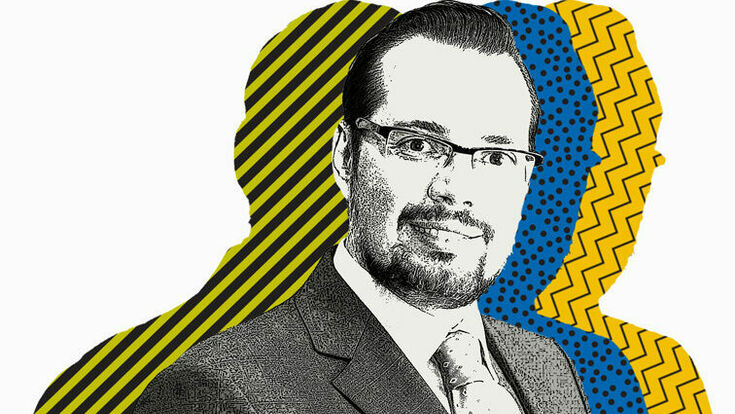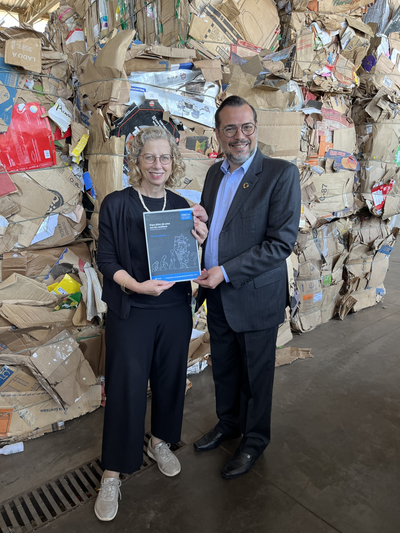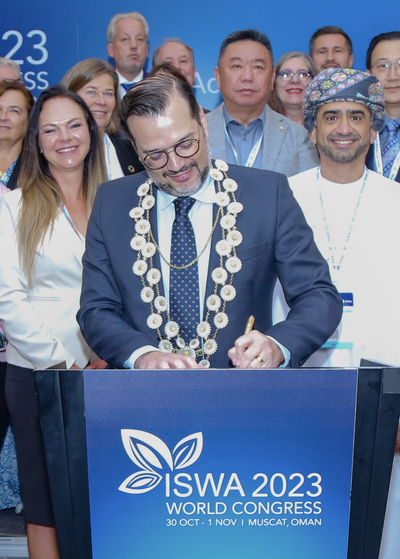Interview with ISWA president Carlos Silva Filho : “I am convinced that ISWA is the right instrument to make change happen”

Can you describe your presidency in three words?
You start with a tough one! (laughs). Well, I would say, global presence, visibility and partnerships.
Why do you think an organisation like ISWA is important?
Because the International Solid Waste Association is the only organisation in the world exclusively advocating for better waste management. This topic is all too often neglected. And being the spokesperson of this association, so to speak, brought me this sense of obligation to stand up for this sector. Not only because the industry deserves it but because society deserves it.
What role does play ISWA for you personally and in your professional life?
First, I would say ISWA is a knowledge hub. With our experts, the volunteers, the working groups, the staff and all our publications. It's something that you cannot get outside of ISWA.
Second comes connections. This I consider one of the most valuable assets: having the right connections to make things happen, to achieve the goals. So, if we have the best knowledge and the right connections, we are able to make the difference and deliver our mission. This is something that I also take on a personal basis: to bring the right message to the right audiences and enable change.
This is something that I also take on a personal basis: to bring the right message to the right audiences and enable change.
Looking back, what was the biggest challenge as ISWA president?
I was first elected to the ISWA board in 2011 as the representative for the regional network for Latin America and the Caribbean. In 2014 I was elected as vice president and now I’m finishing as president in 2024. It's more than a decade I dedicated to the association and I don't regret a day of it.
I’ve been elected as President during COVID period, during the first-ever fully digital General Assembly. And for the first 1.5 years of my term everything was online and by distance, so we had to quickly adapt for this new moment.
But, I’d say the biggest challenge still, is to engage people in this agenda. Not only our internal audience, our members, on the need to develop a new waste – and resources – management system, but to engage external audiences to commit towards better waste management. This is still a challenge.
Do you think people have become more receptive to what professionals have to say over the years?
Yes, fortunately! People are really more open to listening. And we have increased audiences in events, meetings and discussions. However, waste management still is not a trending topic. We are doing the right things and reaching the different and wider channels, but something is still missing to have a broad, international discussion to improve the current system and move towards a circular economy.
You also played a key role in the Global Waste Management Outlook (GWMO), as well as in the local outlook for Latin America and the Caribbean. Why are these reports important? And do you think they got the message out there?
The first global waste management outlook was launched in 2015. It was the first official publication developed by UNEP together with ISWA dedicated solely to waste management. And it attracted some attention. And then they had a series of regional outlooks for example the Latin American Caribbean Outlook, in which I also contributed and participated. They opened this series of global publications by the United Nations to address the challenges and opportunities for waste management.
Some years later, the General Assembly of the United Nations not only recognized the importance of the Global Waste Management Outlook but also requested a second edition. For me, it was a very important signal. However, we realised that although there are high-level discussions, that people are open to learning the implementation into practice is lagging. So for the second edition, we made several adaptions. When we launched it, the GWMO 2 generated a lot of interest, media coverage and discussions at different events. I'm confident that the GWMO 2024 will be a milestone in terms of how we deal with waste management.

You are part of the waste management sector for many years. How has the industry changed?
When I started in the waste industry, some 25 years ago, it was kind of like: Let's get rid of waste. Let's make it disappear.
And even though the first consistent initiatives related to recycling came up, the waste sector was the downstream, the end of pipe guys who come and take things out of our doors. But now, after many years and a lot of discussions waste management reached another level. There is a paradigm change from waste as garbage to waste as a resource. The circular economy has become mainstream. We saw that at last year’s COP, where we had a pavilion for the waste and resources sector for the first time. We have become a player in the room. This is the most important change for me. We are not only requesting to be heard or to be consulted but we are being demanded to contribute to the discussion.
But again, as we discussed, it's not yet happening in practice. The figures of GWMO 2 show that in the world, there are still 38% of the waste going to inadequate or illegal destinations: Open dumping and open burning. 38%! It's a lot and only 19% of the world's waste goes into recycling. So, this kind of indicator gives us a sense of how the picture is. We still lack the funds to implement the necessary solutions in many places around the world – exactly where the waste generation is expected to grow faster.
In terms of having a voice and positioning, there was a big advancement, but there is still so much that needs to be put into practice.
What will be the biggest challenge in the future of waste management?
When we launched the GWMO 2, it was a turning point in terms of positioning for the waste sector. And in my speech during the launch, I repeated what ISWA already said back in 2016: our vision is a world where waste does not exist.
Because in the future we don't have waste, we don't have trash, we have resources, we have secondary raw materials, we have fuels, we have sustainable energy. And it is up to us, the waste management industry to deliver. It is kind of a big change to the waste industry.
The biggest challenge is changing the mindset. Because if we keep insisting on continuing with the same mindset of the 19th century where we put the garbage on the street for the trucks to collect them for disposal to a final destination the population will still look at us as the garbage guys. I would say this is the challenge: to change the perspective, to change the mindset. That waste should not be seen as something without value anymore.
For a fresh mindset, you also need fresh ideas: Back in 2013 you founded the ISWA Young Professionals Group. Why was this important for you?
When I was elected to the board in 2011 I was 34 years old and had been working in the waste industry for about ten years. I was grateful for all the opportunities I had and wanted other young professionals to have the same chances. So it was a no-brainer for me to form this Young Professionals Group to be the entrance door for new generations and the new professionals who would shape the future of the association and the future of the waste industry. And I'm very, very happy to see that this group is very active and engaging people from all over the world.

Do you see that the ideas or the approach of young professionals have changed over the years?
Yes, absolutely. I would say they are much more open and creative and think outside of the box. They try to pick different angles than traditional businesses. They see that the transition is urgent. Their sense of urgency, their anxiety, it's really pushing things.
I'm proud to have helped ISWA to reach a different level in terms of contacts and connections, partnerships and collaborations. Being heard at the different forums, being heard by high-level stakeholders and delivering our messages to them was really, really rewarding.
We've talked about the challenges you faced but what do you see as your biggest success as ISWA president?
My biggest goal was to speak outside our bubble because what I sensed during my mandate before becoming president was that ISWA is a strong association – it was already 50 years old - we have a good network of members, but we were talking mainly among our circles. We were not able to expand our messages to the outside world. This was something that always disturbed me. And when I took the position of president, I took this as my main goal: to speak outside our bubble. And I’m really happy to be able to say that I achieved this goal. I'm proud to have helped ISWA to reach a different level in terms of contacts and connections, partnerships and collaborations. Being heard at the different forums, being heard by high-level stakeholders and delivering our messages to them was really, really rewarding.
Can you share what the future holds for you?
Well, after all these years at ISWA, I feel like this is an extension of family. I feel very connected to everybody there. And sometimes we are not close to our families on an everyday basis, but you are forever connected. And the mission is not over yet. It is not only a commitment to the association itself, but also a commitment I made to myself to try my best to make this world a better place for everybody by improving waste management.And there is still so much to do. For example: In the negotiations for the plastic treaty, we will have again a pavilion at COP29 in Azerbaijan and to continue delivering the messages from GWMO2024. So I will be available to help with whatever ISWA and the new president need. Because I am convinced that ISWA is the right instrument to make change happen.

